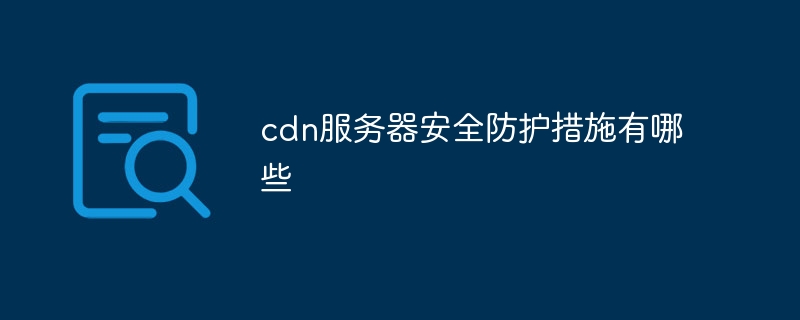Security protection measures include preventing DDoS attacks, deploying WAF, using SSL/TLS protocol encryption, access control, security audit logs, enhanced authentication and authorization, regular security updates and patches, security scanning and vulnerability assessment, and security training and awareness, network isolation and security configuration, etc. Detailed introduction: 1. Prevent DDoS attacks: Use traffic cleaning technology to detect and filter malicious traffic to prevent distributed denial of service (DDoS) attacks; 2. Deploy WAF to detect and block attacks against web applications, such as SQL injection, Cross-site scripting and more.

The security protection of CDN (content distribution network) servers is very important. The following are some common CDN server security protection measures:
- Prevent DDoS attacks: Use traffic scrubbing technology to detect and filter malicious traffic to prevent distributed denial of service (DDoS) attacks.
- Web Application Firewall (WAF): Deploy WAF to detect and block attacks against web applications, such as SQL injection, cross-site scripting (XSS), etc.
- SSL/TLS encryption: Use the SSL/TLS protocol to encrypt the communication between the CDN server and the user to protect the confidentiality and integrity of the data.
- Access control: Through access control list (ACL) or IP whitelist, restrict access to the CDN server to only specific IP addresses or IP address ranges.
- Security audit log: Record and monitor all activities on the CDN server, including access logs, error logs, etc., in order to detect and respond to security events in a timely manner.
- Strengthen authentication and authorization: Use strong password policies and restrict management access to the CDN server to ensure that only authorized personnel can perform management operations.
- Regular security updates and patches: Timely update the operating system, software and components of the CDN server, and apply security patches to fix known vulnerabilities.
- Security Scanning and Vulnerability Assessment: Conduct regular security scans and vulnerability assessments to discover and repair potential security vulnerabilities.
- Security training and awareness: Provide security training for CDN server administrators and related personnel to enhance security awareness and protection capabilities.
- Network isolation and security configuration: Isolate the CDN server from other key systems and perform security configurations, such as closing unnecessary services and ports, restricting network access, etc.
These are some common CDN server security protection measures, but specific protection measures should be customized and implemented according to the actual situation and security requirements. At the same time, it is also very important to conduct regular security assessments and vulnerability scans, and to track and respond to the latest security threats in a timely manner.
The above is the detailed content of What are the security protection measures for CDN servers?. For more information, please follow other related articles on the PHP Chinese website!
Statement:The content of this article is voluntarily contributed by netizens, and the copyright belongs to the original author. This site does not assume corresponding legal responsibility. If you find any content suspected of plagiarism or infringement, please contact admin@php.cn
